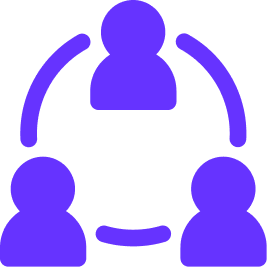Step 1: Scoping
You talk with us about what you actually need. This is what we call scoping. We check what you are after, ask a lot of questions and see if our trainings can fit that somehow. Usually they can, but sometimes they cannot and we are not too shy to say so. More importantly: we will never sell you something that you don’t need or that we aren’t convinced of.

We assess your skill level, or, rather, that of the future participants if possible and where you want that level to progress to.
In this conversation, we will also walk you through the training contents and answer any questions you have. We want you to make an informed decision when choosing us and not just get sold on something. That is necessary for both sides: You don’t want to waste money, and we don’t want to waste our trainers. A trainer can fix and adapt to a lot of things if they are skilled enough, but if the group just doesn’t need what the trainer can teach, then there won’t be a lot of fun for anyone. And as you have learned already: we only do trainings that people will actually enjoy.
Step 2: Prep
We have built, structured and designed a lot of trainings, workshops, webinars and other formats already. But sometimes, there is specific content or a specific format that someone asks for. In that case, we build that content module or format for you.

The preparation also includes organizational things, like where and when the training is happening, what technical environment you are on, how you reach us, how we reach you, who the participants are, if licenses are needed or provided, if the participants need equipment like laptops, monitors or a sheet of paper, and so on.
Step 3: The Training
Be it virtually or in an actual room: Our trainer will be there a bit ahead of time to set up the training environment. After housekeeping (doing introductions, walking through the agenda, explaining how and why breaks work), we dive into the contents. There are two major scenarios:
- A tool-specific training (like Tableau, Power BI, ThoughtSpot, Snowflake or others) is usually “Show & Follow.” That means the trainer explains while demonstrating, and participants follow along on their own machine, replicate what the trainer did and learn by listening, asking and doing.
- A tool-agnostic training or workshop (like Data Literacy, Visual Analytics or others) is usually “Explain, Discuss & Practice.” Here, the trainer talks through content, shares experiences, views or how-tos while participants can join in with their views, discuss topics and practice everything in group exercises.
Our trainers will make sure to adapt to the speed of the group, even when the group is mixed. Yes, that’s possible, although many companies and even schools will tell you it’s not.

Also, it will be a fun environment, where questions are encouraged, curiosity rewarded and diversions from the planned content absolutely allowed. There will be a lot of breaks for the trainees to gather their thoughts let the content sink in, while the trainer will always be available for questions during breaks.

Above: The average InterWorks training experience. (In spirit, anyways.)
We do not give homework for the next training session. We know homework is a valid mechanism to reiterate and practice learned content, but we are aware of the business reality of most companies. Homework would mean another hour of learning on that day, and that’s another hour the student doesn’t do their usual work. In the end, there are three situations, each worse than the other:
- The student doesn’t do the homework, because there’s no time.
- The student does the homework, but with the trade-off of lost working time.
- The student does the homework half way, which helps neither them nor the company.
Meaning, when the training is over for the day, the student doesn’t need to think of preparing anything for the next day and can focus on other things. And as we learned in Blog #2, our working memory doesn’t handle distractions very well.
Step 4: Ending the Training
At the end of every training, we ask for feedback. Sometimes in verbal, sometimes in a written form. Of course, we love when we get positive feedback. But we also encourage everyone to think about what we could have done better. And since the whole training is a very open and at the same time safe round of people, everyone feels safe to also say things that fall more into the constructive bucket. We love that, too. Believe me, we wouldn’t have become some of the most renowned analytics trainers in the world without that kind of feedback.

The students will either have their training materials they worked with during the training, or a slide deck, hand-outs or other materials if they ever need to look up something.
If requested, we also hand out certifications that can be added to a CV or hung on a favourite wall.
Step 5: After the Training
Our dedication to your training success goes beyond the training room. We know that learning is an ongoing process, and we want to ensure that our participants feel supported every step of the way. After completing our courses, we don’t simply bid farewell. Instead, we open a continuous channel of communication for any smaller questions or clarifications, even beyond the training period.

Whether through informal emails later on or scheduled consulting hours, we’ll be here to assist you as you apply your newly gained skills.


